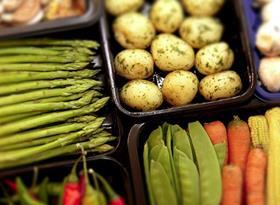
The NFU has broadly welcomed Defra’s plans to tackle food and packaging wastebut the union expressed concerns that the government’s environmental powers could become too wide-reaching.
Earlier this weekDefra secretary Michael Gove launched the Resources and Waste Strategypolicy paper, laying out plans to reduce and tax the use of single-use plastics, simplify household recycling, make retailers and packaging manufacturers pay for collection and recycling, and end food waste.
Retailers that use difficult-to-recycle materials including black plastic trays could face penalty charges under the plan, while lower fees could be charged for packaging that is easy to reuse or recycle.
In addition to a tax on single-use plastics, the strategy would also consider a ban on plastic packaging where alternatives exist, and could see best before labels scrapped for fruit and vegetables.
The document follows the government's 25 Year Environment Plan, published in April, and the Agriculture Bill, to reshape UK farming policy after Brexit, which is currently being voted on in Parliament.
Commenting on the implications of the Agriculture Billand Resources and Waste Strategy for farmers,NFU vice president Stuart Roberts said he found the plans 'encouraging' but voiced concerns about the use of farmers’ data, the issue of industrial fly tipping and the strategy’s vagueness regarding agricultural plastic.
He said: “It is encouraging to see the strategy reiterate that the government is seeking powers in the Agriculture Bill to protect farmers and growers from exposure to unfair trading practices, such as late changes to product specifications, which can see perfectly good food go to waste.
“Data will play an important part in helping to reduce waste but we have concerns that the powers in the Agriculture Bill are too wide and without proper explanation of what this data will be used for.
“Another major issue is large-scale, industrial fly-tipping. The NFU has been calling for a targeted approach to tackling waste crime and the introduction of a Joint Unit for Waste Crime is welcome news. It is imperative that farmers are involved during the development of this unit to ensure it is fit for purpose.
“Unfortunately, the strategy is very vague regarding agricultural plastic. While the government has committed to explore options, it is time to see solutions. This could be increasing the number of domestic outlets available for farm plastic recycling or investing in cleaning facilities to improve the contamination levels of plastic.”
Roberts added that the NFU remained committed to “engaging with the government on its strategy” and would continue to work with Defra, the Environment Agency and others in the supply chain to tackle food waste, plastic pollution and other environmental issues.